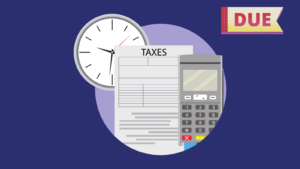Capital gain tax on sale of property in India
Capital gain tax on sale of property in India is governed by the Income Tax Act, 1961. The tax rate and calculation depend on whether the immovable property is held for a short term or long term. The tax is categorized as either Short-Term Capital Gains (STCG) or Long-Term Capital Gains (LTCG) based on holding period.
What is short term capital gain (STCG)?
When you sell an immovable property, which you’ve held for period 2 years and less, the profit (sale price minus purchase cost) is classified as short-term capital gain. This STCG is taxed as per applicable tax slab rate of the Income Tax Act. There are no exemptions for STCG provided like 54, 54F, 54EC, 54GB exemptions are there for LTCG.
What is long-term capital gain (LTCG)?
When you sell an immovable property, which you’ve held for more than 2 years, the profit (sale price minus purchase cost) is classified as long-term capital gain. Section 112 of the Income Tax Act taxed this LTCG tat special rates.
How is LTCG Tax Calculated?
1. Calculate the LTCG
Here’s the formula to determine your LTCG:
LTCG = Sale Price – (Indexed Purchase Cost + Transfer Costs + Costs of Improvements)
- Sale Price: The amount you receive for selling the immovable property.
- Indexed Purchase Cost: Adjust the original purchase price for inflation using the Cost Inflation Index (CII) published by the government.
- Transfer Costs: Expenses like stamp duty, registration fees, or broker commissions.
- Costs of Improvements: Expenses incurred on renovations or additions to the property.
2. Apply the Tax Rate
The tax rate on LTCG depends on the date of sale:
- 20% for property sold before July 23, 2024 (with indexation).
- 12.5% for property sold on or after July 23, 2024 (without indexation).
Summary of capital gain tax on sale of property based on sale date :
| Property Purchase Date | Property Sale Date | Applicable Tax Rate | Indexation Benefit |
|---|---|---|---|
| Before July 23, 2024 | Before July 23, 2024 | 20% | Available |
| Before July 23, 2024 | On or After July 23, 2024 | 12.5% (default) or 20% with indexation | Taxpayer can choose the better option |
| On or After July 23, 2024 | On or After July 23, 2024 | 12.5% | Not Available |
Indexation vs. Lower Tax Rate (After July 23, 2024)
If you’re an individual or a Hindu Undivided Family (HUF) and a tax resident of India, and if your property was purchased before July 23, 2024, you have the following two option:
- Pay tax at the lower 12.5% rate, or
- Opt for the 20% rate with indexation.
Why Choose Indexation?
Indexation adjusts the purchase price for inflation, reducing your taxable gain. It is beneficial when inflation has significantly increased the property’s value over time.
For instance:
-
-
- Without indexation: A purchase price of ₹10 lakh remains ₹10 lakh.
- With indexation: The adjusted cost (using the CII) could rise to ₹15 lakh, reducing your LTCG.
-
If the 20% tax (after indexation) results in a lower liability than the 12.5% tax (without indexation), you can choose the indexation method.
How to Save LTCG Tax on Property Sales?
The government provides tax-saving options as follows:
| Section | 54 | 54EC | 54GB | 54F |
|---|---|---|---|---|
| Exemption to | Individual or HUF Only | Any assessee | Individual or HUF Only | Individual or HUF Only |
| Sale of long term capital asset | being residential house/land appurtenant thereto | being land/building or both (residential or commercial) | being Residential Property | any long term asset except residential house |
| Which amount to invest? | Amount of Capital Gains | Amount of Capital Gains | Total sales proceeds | Total sales proceeds |
| Investment made in Purchase of | A new (only 1) residential house in India. | Specified Bonds of NHAI or RECL (These bonds will now have maturity of 5 years or more) | Purchase of Equity Shares of an Eligible Company in which the assessee holds 50% or more shares/voting power, and the Eligible Company makes investment in new plant and machinery as prescribed | A New Residential House (only 1) in India |
| Time Period of Purchase | If Purchased, within 1 year before or 2 years after the transfer date;*
If Constructed, within 3 years from the transfer date. * |
Within 6 months of the transfer date | Before the due date of ITR* | If Purchased, within 1 year before or 2 years after the transfer date;*
If Constructed, within 3 years after the transfer * |
| New asset should be hold for (restriction) | 3 years | 5 years | 5 years | 3 years |
| what if new asset is sold within a restricted period, as above | If new asset sold within 3 years, while calculating Capital Gains, Capital Gain exempt earlier will be reduced from its Cost of Acquisition | On sale of securities or otherwise conversion into money within 5 years, LTCA exempted earlier will be taxable in the year of such sale or conversion. | If new asset (shares or plant and machinery) sold within 5 years, then amount of LTCG exempted earlier will be taxable in the year of such sale in the hands of respective assessee | If new asset sold within 3 years, then amount of LTCG exempted earlier will be taxable in the year of such sale |
*If the investment in a new asset is not made before the due date for filing the tax return, the amount must be deposited in a specified bank under the Capital Gains Account Scheme by that due date
#Please note: here reference to property means an immovable property like flat, building etc.


